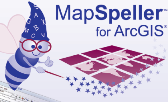|
|
Version 4.0 |

Conventional Spell-Checking
|
||

Conventional Spell-Checking |
||
|
Conventional spell-checkers validate words from a document against one or several dictionaries.
Dictionaries are lists of words that are deemed correctly spelled. If there
the word being proofed matches a dictionary word, it is deemed
correctly spelled. Otherwise, it is considered potentially
misspelled. It the latter case, the spell-checking software typically
searches its dictionaries for replacement words; words that are similar
to the potentially misspelled word. The user can substitute the
misspelled word with one of those words when appropriate, or perform other
related tasks. Word-processor and email spell-checkers have typically two dictionaries: a language dictionary (also called system dictionary) and a user dictionary (also called personal dictionary). The language dictionary contains most of the words in a particular language but can't be edited by the end-user. The user dictionary is personal and can be edited by its owner (as determined by that person's computer login). Grammar rules aside, when spell-checking a document conventionally, the location of a word in a document has typically no influence on its spelling status. For example, the location of a word on this web page (at its beginning, middle or end) has no bearing on its spelling status. While conventional spell-checking is well suited for proofing language words, it doesn't handle geographic names well. This is why MapSpeller spell checks both conventionally and spatially. MapSpeller complements its conventional spell-checking capabilities with its patented spatial spell-checking functionality. This enables it to take the geographic location of words in maps and feature classes into consideration when proofing geographic nouns or other location-bound text. |
|
| Related Topics | |
|
|
| MapSpeller™ for ArcGIS® Page last updated on October 07, 2017 Copyright © 2001-2013 Edgetech America, Inc. All Rights Reserved. |
|
|